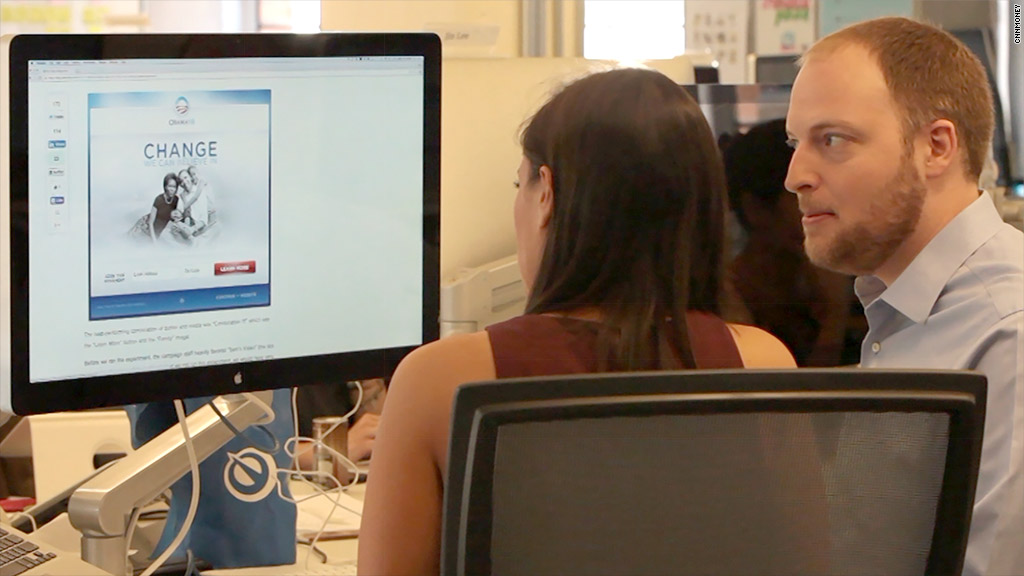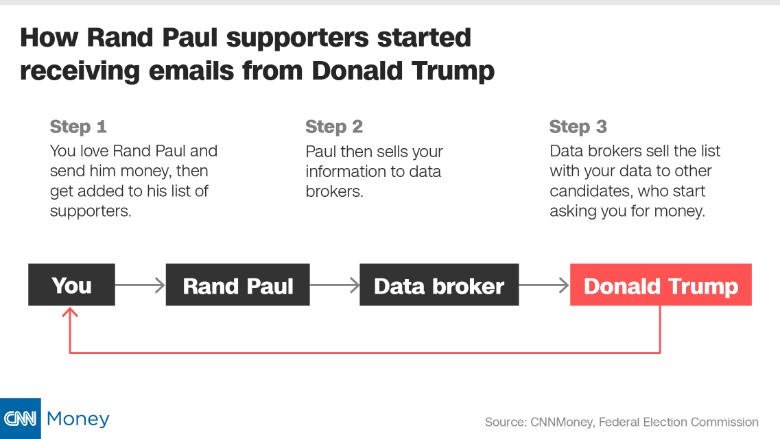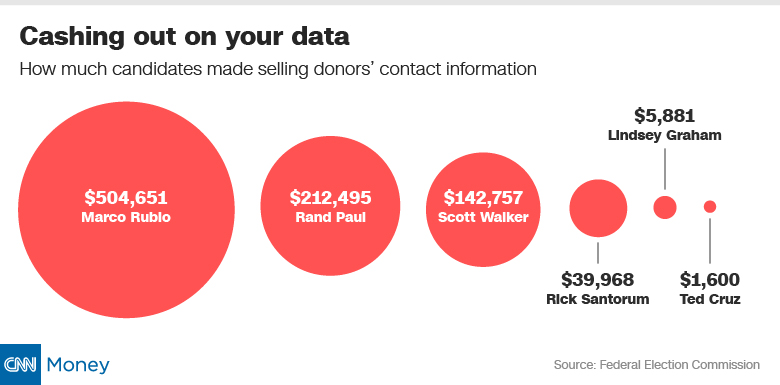
Senator Ted Cruz's final email to supporters before dropping out in May was titled, "What I really think about Donald." In it, he called Trump "a pathological liar."
Fifteen days later, Cruz donors got an email from the Trump campaign.
"Will you stand with me as I continue the fight? Make an immediate contribution," Trump's email said.
The same thing happened to donors who supported Senator Rand Paul, who at one point called Trump "a delusional narcissist and an orange-faced windbag." Paul's Libertarian-leaning donors have gotten pelted with at least eight emails from the Trump campaign seeking cash in June.
How did Cruz and Paul supporters suddenly end up on Trump's email list?
Failed candidates sell, rent or loan their supporters' email addresses to other candidates, marketing companies, charities and private firms.

Nearly every 2016 presidential candidate has done this, according to a CNNMoney analysis of thousands of emails and Federal Election Commission records.
It's difficult to piece together exactly who is selling what to whom.
"You don't often see direct payments from other campaigns because most everyone works through list brokers," said Bob Biersack, a former FEC official and now a senior fellow at the Center for Responsive Politics.
Data sharing is a prized sideline for political campaigns. Marco Rubio banked $504,651 by renting out his list of supporters, according to FEC records. Paul made $212,495 this way. Wisconsin Governor Scott Walker raked in $142,757.
Related: Rick Santorum donor data was bought by doomsday preppers
CNNMoney determined those totals by examining monthly FEC filings, adding up each candidate's "List Rental Income," which denotes how much money they made selling access to donor lists. The candidates' FEC expense filings were also examined to identify which data marketing firms they hired.
"There's nothing more valuable to a campaign than information about would-be supporters," said Daniel Tokaji, an expert on election law who teaches at Ohio State University.

It might be surprising, but not illegal. When you donate to a campaign, the fine print says they're allowed to do this with your personal information.
What is clear is that nearly all of the presidential candidates are sharing your data this year. That became obvious thanks to a novel experiment by a computer security expert in Atlanta, Georgia.
The experiment
Last September, Robert Graham decided to track each political campaign's fundraising emails. He started 26 unique email accounts on his own computer server, then donated $10 to each political campaign with a separate email address each time.
That way, the email address Graham set up to receive Jeb Bush emails only got messages from Bush. If it started getting emails from someone else, Graham knew the Bush campaign had shared the address.
The test worked. As candidates dropped out of the race, the unsolicited emails started flooding in.
Shortly after New Jersey Governor Chris Christie made his exit, his donors started getting emails from his most bitter rival -- Rubio.
After Rubio quit the race, his donors started getting unsolicited emails from the campaigns of Cruz, Paul, and two U.S. Representatives: Mia Love of Utah and Trey Gowdy of South Carolina. They also got messages from former U.S. Ambassador John Bolton's conservative political action committee, two national Republican groups, and the American Veterans Center.
According to federal records, Rubio shared his donor lists with the advertising company Campaign Solutions. Rubio's campaign, which is now gearing up to get him re-elected to the Senate, declined to comment.
John Kasich donors got emails from Love, Rubio, Senator John McCain, Senator Rob Portman, the American Veterans Center and a Republican committee.
Walker's donors got unsolicited messages from Bush, Carson, Cruz, Kasich, the pro-Trump Great America PAC, and Senator Ron Johnson. Records show Walker's campaign got paid by data broker Granite Lists.
Those who gave money to former Texas governor Rick Perry might have noticed a twist in their new emails. His donors got messages asking for money to support Carson, Cruz and Rubio. In the headers of these emails, they appear to come from the Carson, Cruz and Rubio presidential campaigns. But buried at the bottom of each message was an odd disclaimer: "This email was sent by: Romney for President, Inc." That means Mitt Romney's camp is still collecting donor lists, even though he's not running for office.
None of the presidential campaigns responded to CNNMoney's requests for comment except for Rand Paul's spokesman Sergio Gor who said, "Our campaign follows normal practices for our fundraising, and always has."
Records show Paul's campaign got paid by data brokers Capitol Hill Lists, Targeted Victory and Victory Phones.
Wondering where the Democrats are? Donors to former secretary of state Hillary Clinton received lots of emails from the Democratic Congressional Campaign Committee -- but she never reported any income from the transaction on FEC records.
Federal candidates are allowed to quietly swap lists with their national party groups, said Cleta Mitchell, a political law attorney in Washington.
Bernie Sanders, who has received small donations from more than 2 million people, appears to be holding back from sharing his list.
"People are probably drooling over that list," said David Keating, who leads the Center for Competitive Politics. He was previously in the marketing industry and saw this data-trading business firsthand.
Data deals kept secret
While Graham's experiment indicated that nearly all of the candidates were sharing their donors' information, records don't clearly show these transactions.
Bush, Carson, Christie, Clinton, Huckabee, Kasich and Perry haven't reported any income for "list rental" from data brokers yet. But unsolicited emails keep clogging Graham's email inboxes for those candidates.
That's probably because they're trading this valuable asset in opaque ways, said former FEC chairman Dave Mason.
Candidates can swap lists with each other without having to report it, he said. And it's common for a fundraising consultant to approach a politician and offer a steep discount -- on the condition that they get to own the donor list and later sell it themselves.
"This is how people in this business make money," said Mason, an executive at Aristotle International, a company that helps run campaigns and also engages in this kind of email marketing.
Tal Yellin contributed graphics to this story.
